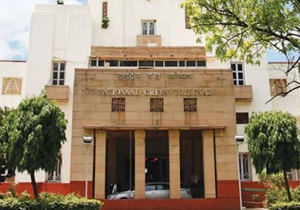New Delhi, Mar 9: Faced with tough questions from National Green Tribunal (NGT), the Water Resources ministry today told the panel it has not granted permission for 'World Cultural Festival' being organised by Sri Sri Ravi Shankar's Art of Living foundation from March 11 while another ministry said no clearance was required for temporary structures.
 Responding to questions from the green panel, the Water Resources ministry distanced itself from the controversy, saying it has not given any clearance for the three-day event.
Responding to questions from the green panel, the Water Resources ministry distanced itself from the controversy, saying it has not given any clearance for the three-day event.
The Ministry of Environment and Forests, whereas, told the the NGT bench headed by Justice Swatanter Kumar that no environment clearance was required for setting up temporary structures on Yamuna flood plains.
The ministry's submission came after the tribunal, which was hearing pleas seeking cancellation of the festival on the flood plains of Yamuna river, had pulled it up for not filing an affidavit regarding environmental clearances.
During the hearing, the green panel asked the counsel appearing for Art of Living (AOL) to take instructions not to put enzymes into river Yamuna without Delhi Pollution Control Committee's permission, to which the foundation later agreed.
The tribunal also asked the Centre, Delhi govt, DDA if any environment impact assessment was carried out regarding preparation and consequential effects of the festival.
The tribunal was informed by the Delhi government that the police, after inspecting the site, had asked the foundation to show if they have structural safety clearance of pontoon bridge and vehicle parking clearance.
Delhi govt also told the bench that CPWD has asked the foundation to build a separate stage for the Prime Minister due to issues over structural safety, a claim denied by the AOL which said it was being built for better view of the event.
The counsel appearing for Ministry of Water Resources told the bench, "We have not granted any permission regarding the event and no application is pending with us on the same."
The foundation, however, informed the bench that all necessary steps for safety of the people have been taken saying any untoward incident at the venue will be detrimental to country's image.
Giving the details of the expenditure incurred on the event, the AOL foundation informed the green panel that a total of Rs 25.63 crore has been spent on the entire preparation.
The TRIBUNAL had questioned yesterday the building up of pontoon bridge by the Army on river Yamuna for the festival, and asked the Delhi Development Authority (DDA) counsel as to who gave the permission for setting it up.
DDA, Delhi government, MoEF said that they have no relation with the grant of permission for setting up the pontoon bridge as all the three said that they are concerned only with different issues.
DDA had also informed the NGT that it granted permission for 24.44 hectare for holding of the event in which 3.5 lakh to 5 lakh people are likely to participate and has till now not found any violations of its conditions by organizers of the event.
The tribunal had asked all the parties to consider the impact of such an event on the environment, river, ecology and biodiversity.
Counsel for AOL had said that it has no instructions about the study of environment impact assessment but it has satisfied the DDA for permission by fulfillng the condition that no permanent structures will be constructed on flood plains.
AOL said that no concretization has been done, no permanent structure has been built and only wood, clothes and bamboo is being used at the site.
The NGT, which was also hearing a plea against AOL's plan to release 'enzymes' into 17 drains joining Yamuna for cleaning the river, had constituted an expert committee headed by Water Resources Secretary to inspect the site of the proposed festival.
The AOL foundation, which is organising the function, will have yoga and meditation sessions, peace prayers by Sanskrit scholars and traditional cultural performances from India and abroad.
Environmental activist Anand Arya, who filed the petition to stop the event, rued that over 1000-acres of the sensitive area between Delhi and Noida, predominantly marshland, stand shorn of even a "single blade" of grass.
Another petitioner Manoj Mishra of Yamuna Jiye Abhiyaan questioned the "legality" of the event, and said the area, being destroyed "every moment", will take a long time to recover and slammed the organisers for the "lack of understanding" on their part.





Comments
Add new comment